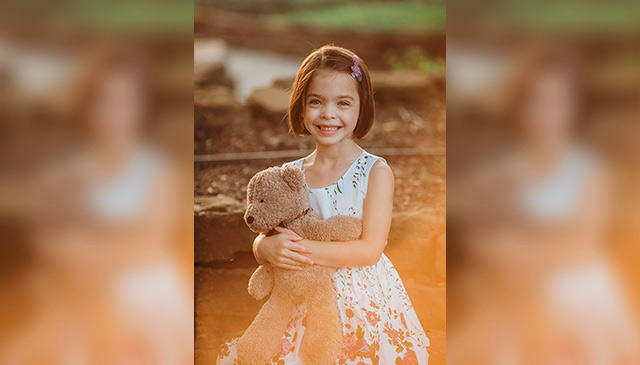
The first year after losing her 7-week-old daughter, Ella Grace, Katie Hurlbut felt especially isolated and alone.
Ella’s surviving twin sister was home from Texas Children’s Newborn Center, but still considered high-risk and required special care. Tending to her needs while also processing the grief of Ella’s passing was overwhelming.
“My main hope was to find a purpose for the pain that I was going through,” said Hurlbut, a nurse practitioner at Texas Children’s Pediatrics Humble-Atascocita. “What helped me most was helping other bereaved families. That’s how I could move forward.”
Intent on bringing something positive out of their experience, Hurlbut looked for opportunities to connect with Texas Children’s parents and families facing similar situations. For her first project, she raised funds to establish The Butterfly Room in the NICU at the Pavilion for Women – a private space, outfitted like a nursery, for bereaved families to say goodbye to their babies.
Three years later, Hurlbut and the Palliative Care team have now launched the Bereaved Parent Mentor Program to provide another source of comfort and support for families mourning unimaginable loss.
“No parent should ever have to walk through grief alone,” Hurlbut said. “We want them to know it is possible to survive a loss like this. Your life can go on, and it can be something that has purpose and meaning.”
Bringing the program to life
Several times after The Butterfly Room opened, Hurlbut found herself speaking with heartbroken parents whose babies were nearing end of life. She realized how much she would have appreciated having another bereaved parent to talk to during that first harrowing year of grieving Ella, and resolved to bring the idea of a mentor program to NICU leaders.
Taryn Schuelke, who had taken on the role of Grief and Bereavement Specialist in 2016, became Hurlbut’s partner in the effort. She believed the Bereaved Parent Mentor Program would be a perfect fit for the goals of the Palliative Care Service, and was thrilled her leaders immediately acknowledged the need and pledged support.
“It’s such a sacred experience to work with these families,” Schuelke said. “When they leave the hospital without their children, it’s a devastating shock. This is a very tender and delicate time for them; they’re lost and overwhelmed. This mentor program truly provides a service that is necessary. It bridges the gap and helps tie families back into their community.”
With guidance from experts at St. Jude’s Children’s Research Hospital, Hurlbut and Schuelke designed a mentor program for Texas Children’s that draws volunteers from the Palliative Care Family Advisory Council. Mentors complete extensive training to prepare for the different situations and perspectives they may encounter.
Prospective mentees are identified and screened, then matched with a mentor who initiates contact within 24-48 hours. Mentors and mentees are paired for a 15-month period and expected to talk at least once a month during that time, when birthdays, holidays and other family milestones can be hardest to endure. Every interaction is documented.
“The most important thing for them is, ‘Will I ever get over this? Will I ever be normal again?’” Hurlbut said. “It’s about having that partnership with someone else who has walked that road before you and can tell you what you’re feeling is normal and it gets different with time.”
Achieving positive outcomes
Though still in its early stages, the Bereaved Mentor Program has already produced positive outcomes for Texas Children’s families. Hurlbut and Schuelke hope to see the program expand beyond the Palliative Care team someday to support other families in need.
“It’s hearing those families stories, knowing they felt so alone and seeing them take that next breath, live their next day,” Schuelke said. “To hear the relief in their voice when I say we have a mentorship program, that they have someone to turn to, that they won’t feel strange or wrong for talking about this. It’s helping them find comfort in this space.”
Hurlbut also takes added comfort in knowing the program is rooted in Ella’s memory.
“Every bereaved parent wants their child to have some type of legacy. You want to make sure they’re never forgotten,” she said. “Everything that we’ve done through Texas Children’s has brought me peace in knowing that Ella’s legacy is going to live on.”

